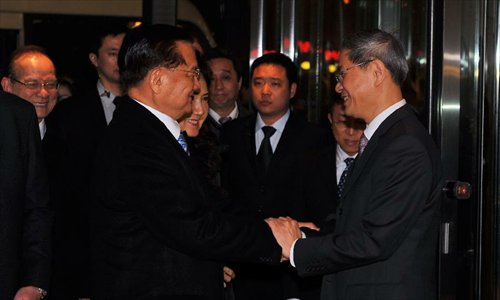Cross-Straits ties on fast track amid KMT visit

Zhang Zhijun (R), head of the State Council Taiwan Affairs Office, welcomes a delegation led by Kuomintang Honorary Chairman Lien Chan (L), also chairman of a foundation on cross-Strait peaceful development, at their hotel in Beijing, China, Feb. 17, 2014. Photo: Xinhua
Cross-Straits relations have embarked on a fast track to development, as a key figure of Taiwan's Kuomintang (KMT) on Monday started a visit to the mainland, only days after the first official cross-Straits talks in 65 years.
Analysts attributed the progress to a more pragmatic and urgent approach taken by Xi Jinping, general secretary of the Communist Party of China Central Committee, though they also warned of uncertainties, partly due to the possible change in the ruling party in Taiwan which may cause a lack of continuity in the island's policies.
Lien Chan, honorary chairman of the KMT, on Monday arrived in Beijing with a delegation from a wide range of sectors in Taiwan for a mission of mutual understanding. He will hold a meeting with Xi before concluding the visit on Thursday.
Lien's meeting with Xi occurs right after the mainland and Taiwan's officials in charge of cross-Straits policy held a historic meeting last week, with both sides agreeing to set up a mechanism for regular communication across the Straits.
"Aside from inheriting his predecessors' principles that problems should be solved gradually, from the easy ones to difficult ones, Xi stresses on the urgency of solving the problems and hopes there are further breakthroughs," Yang Lixian, a deputy secretary-general of the Beijing-based National Society of Taiwan Studies, told the Global Times.
Xi emphasized in October 2013 that long-running cross-Straits political disputes will eventually be resolved, though the process may be slow, at a meeting with Taiwanese politician Vincent Siew. "We cannot hand these problems down from generation to generation," he said.
While meeting with Wu Poh-hsiung, honorary chairman of the KMT, in June 2013, Xi claimed that a road map should be made for the development of cross-Straits ties.
Xi is making more pragmatic and open-minded adjustments under the one-China framework, said Li He, a research fellow with the Institute of Taiwan Studies at the Chinese Academy of Social Sciences. He noted that during last week's cross-Straits talks, the two officials addressing each other by their official titles was an example of a breakthrough.
"The effect of Xi's approach is emerging and it will be shown throughout his remaining years in office. The situation on cross-Straits ties will be more optimistic in the following years with promising political breakthroughs," Li said.
While cross-Straits interactions seemingly occur mainly between the KMT and the mainland, both experts said the mainland is willing to cooperate with the island's opposition Democratic Progressive Party (DPP) if they support the peaceful development across the Straits, but warned that challenges remain.
Hsieh Chang-ting, a contender for chairman of the DPP, earlier this month showed his willingness to visit the mainland if he's elected as the party's head.
Several DPP officials also visited the mainland in recent years.
"But the DPP's position on supporting the independence of Taiwan has not been much changed and there are concerns that if the DPP comes to power in 2016, cross-Straits ties will go backward," Yang said.
According to Li, for the mainland, all topics could be put on the table for negotiation as long as it was under the one-China framework. Therefore, any cross-Straits breakthrough would be largely decided by the changing politics in Taiwan, which may result in inconsistent policies toward the mainland due to a power shift.